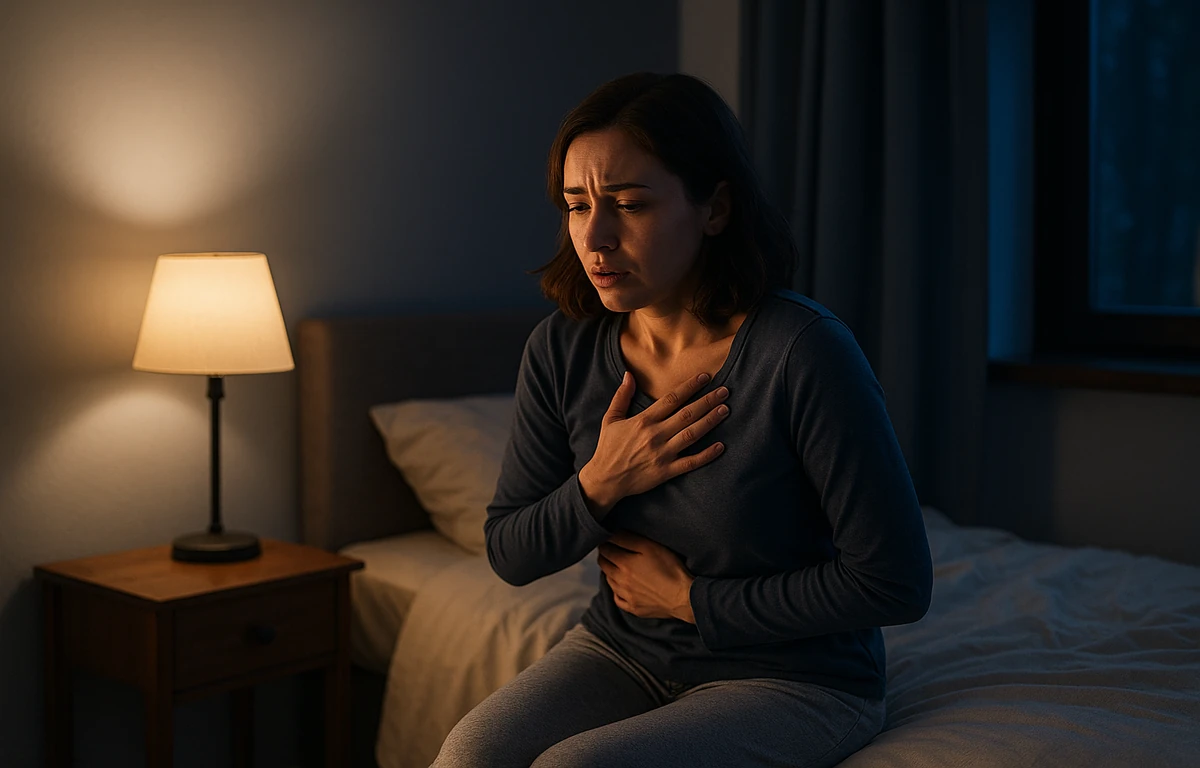A panic attack is a sudden and very intense wave of fear or anxiety that can strike even in complete calm. A person wakes up in the middle of the night feeling that something terrible is happening: the heart is racing, breathing is difficult, the chest feels tight, and the body alternates between heat and cold. The thought “I’m dying” flashes through the mind. In reality, it’s not true. A panic attack is not a life-threatening condition but an exaggerated response of the nervous system to internal stress. To get through it, you need to know how to act properly.
Real-life example
Marina, 34, a successful sales manager, had been under constant stress: deadlines, calls, team responsibility. During the day she kept herself “together,” but one night she woke up unable to breathe. Her heart was pounding so fast that she thought she was having a heart attack. Her husband called an ambulance, but after examination, the doctor said, “Your heart is healthy. This was a panic attack.” The next day, Marina felt exhausted and was afraid to fall asleep again, fearing a recurrence. Later she saw a psychotherapist, learned breathing and grounding techniques, and within a month was able to fully control these episodes. Her story is typical: night panic is not dangerous, but it requires attention and the right approach.
Why it happens at night
Nighttime panic attacks often feel scarier than daytime ones because a person wakes up disoriented, in darkness, without a sense of control over their body. During the day, external stimuli — light, people, noise — help distract the mind, but at night you are alone with your fears. Common causes include:
- Chronic stress. If the nervous system stays tense all day, it continues to react even during sleep.
- Anxious thoughts before sleep. When you go to bed with worries, the brain keeps processing them subconsciously.
- Lack of sleep or disrupted routine. Sleep deprivation increases cortisol, the stress hormone, which can trigger attacks.
- Psychological trauma. Suppressed emotions or memories may surface when conscious control fades.
- Physical causes. Sleep apnea, hormonal imbalance, or digestive problems can provoke panic-like sensations.
How to recognize a nighttime panic attack
Symptoms include a racing heart, sweating, shortness of breath, dizziness, fear of dying, nausea, and detachment from the body. Attacks last 5–20 minutes but feel endless. Afterwards, fatigue and fear of sleeping again are common.
What to do during a panic attack at night
1. Acknowledge what’s happening. Tell yourself: “This is a panic attack. It’s temporary and harmless.”
2. Focus on breathing. Inhale slowly through your nose for three counts, pause, then exhale through your mouth for four.
3. Ground yourself. Use the 5-4-3-2-1 technique: name five things you see, four you can touch, three you hear, two you smell, one you taste.
4. Repeat calming phrases. “I’m safe.” “My body is just reacting to fear.” “This will pass.”
5. Turn on a light. Soft light reduces the feeling of isolation.
6. Move gently. Sit up, stretch, walk slowly, sip some water.
7. Rest afterwards. When the attack subsides, breathe deeply, relax, and only then go back to sleep.
If your night-time panic attacks go hand in hand with sleep problems, frequent awakenings or the feeling that your nervous system “never switches off”, take a look at our guide on sleep and the nervous system, where we explain in detail how stress, hormones, evening habits and your rest routine affect sleep quality and why the nervous system can start reacting with night-time anxiety.
Prevention
Keep a regular sleep routine, avoid caffeine and alcohol in the evening, and create relaxing bedtime rituals. Light exercise and fresh air during the day help reduce anxiety levels.
When to seek help
If attacks occur regularly, consult a psychologist or psychotherapist. Professional help identifies underlying causes and teaches regulation techniques. Panic disorder is treatable — with proper care, you can restore peaceful sleep and confidence.









